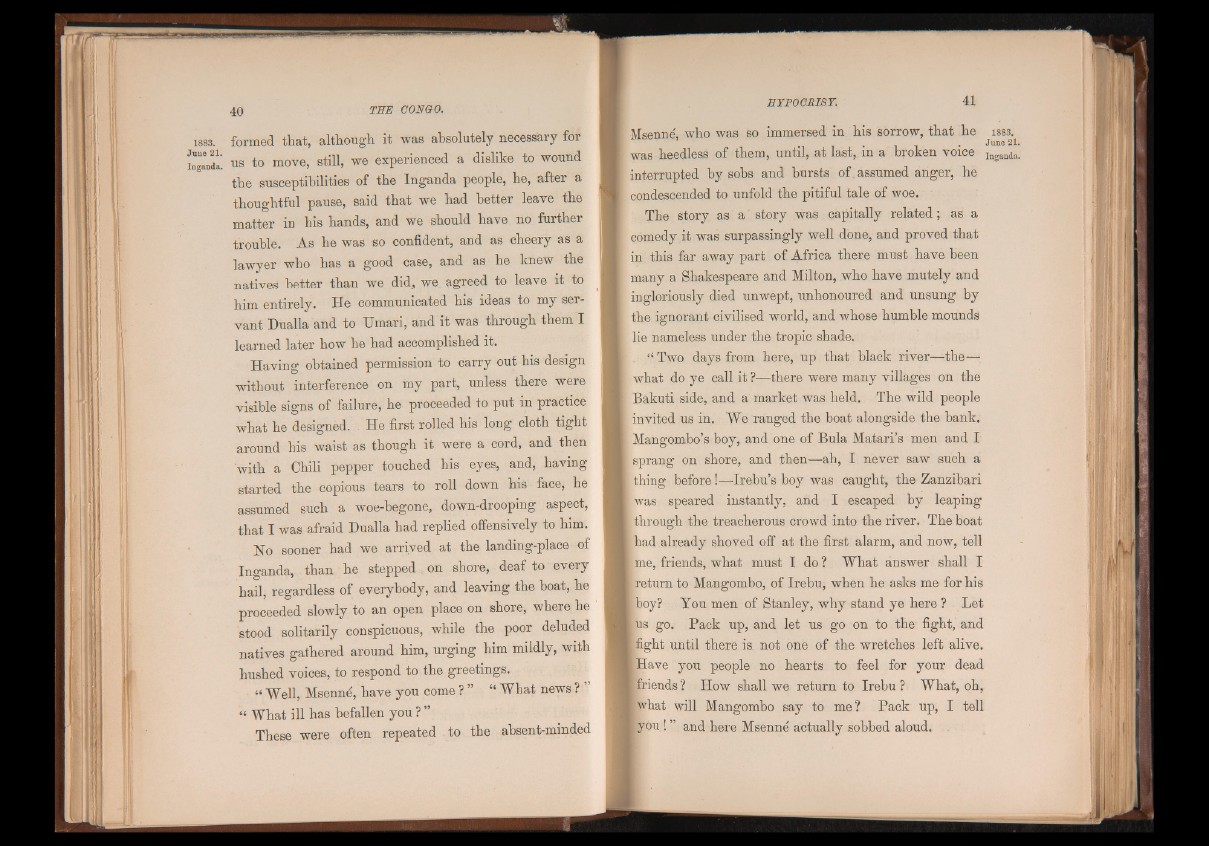
1883.
June 21.
Inganda.
formed that, although it was absolutely necessary for
us to move, still, we experienced a dislike to wound
the susceptibilities of the Inganda people, he, after a
thoughtful pause, said that we had better leave the
matter in his hands, and we should have no further
trouble. As he was so confident, and as cheery as a
lawyer who has a good case, and as he knew the
natives better than we did, we agreed to leave it to
him entirely. He communicated his ideas to my servant
Dualla and to Umari, and it was through them I
learned later how he had accomplished it.
Having obtained permission to carry out his design
without interference on my part, unless there were
visible signs of failure, he proceeded to put in practice
what he designed. . He first rolled his long cloth tight
around his waist as though it were a cord, and then
'with a Chili pepper touched his eyes, and, having
started the copious tears to roll down his face, he
assumed such a woe-hegone, down-drooping aspect,
that I was afraid Dualla had replied offensively to him.
No sooner had we arrived at the landing-place of
Inganda, than he stepped on shore, deaf to every
hail, regardless of everybody, and leaving the boat, he
proceeded slowly to an open place on shore, where he
stood solitarily conspicuous, while the poor deluded
natives gathered around him, urging him mildly, with
hushed voices, to respond to the greetings.
“ Well, Msenne, have you come ? ” “ What news ? ”
“ What ill has befallen you ? |
These were often repeated to the absent-minded
HYPOCRISY. 41
Msenne, who was so immersed in his sorrow, that he 1883.
was heedless of them, until, at last, m a broken voi• ce i^nugnaenda.
interrupted by sobs and hursts of. assumed anger, he
condescended to unfold the pitiful tale of woe.
The Story as a story was capitally related; as a
comedy it was surpassingly well done, and proved that
in this far away part of Africa there must have been
many a Shakespeare and Milton, who have mutely and
ingloriously died unwept, unhonoured and unsung by
the ignorant civilised world, and whose humble mounds
lie nameless under the tropic shade.
“ Two days from here, up that black river—the—
what do ye call it ?—there were many villages on the
Bakuti side, and a market was held. The wild people
invited us in. We ranged the boat alongside the bank.
Mangombo’s boy, and one of Bula Matari’s men and I
sprang on shore, and then—ah, I never saw such a
; thing before!—Irebu’s boy was caught, the Zanzibari
[ was speared instantly, and I escaped by leaping
! through the treacherous crowd into the river. The boat
I had already shoved off at the first alarm, and now, tell
I me, friends, what must I do ? What answer shall I
I return to Mangombo, of Irehu, when he asks me for his
Iboy? You men of Stanley, why stand ye here ? Let
[us go. Pack up, and let us go on to the fight, and
I fight until there is not one of the wretches left alive.
jHave you people no hearts to feel for your dead
I friends ? How shall we return to Irehu ? What, oh,
Iwliat will Mangombo say to me? Pack up, I tell
¡y o u !” and here Msenne actually sobbed aloud.